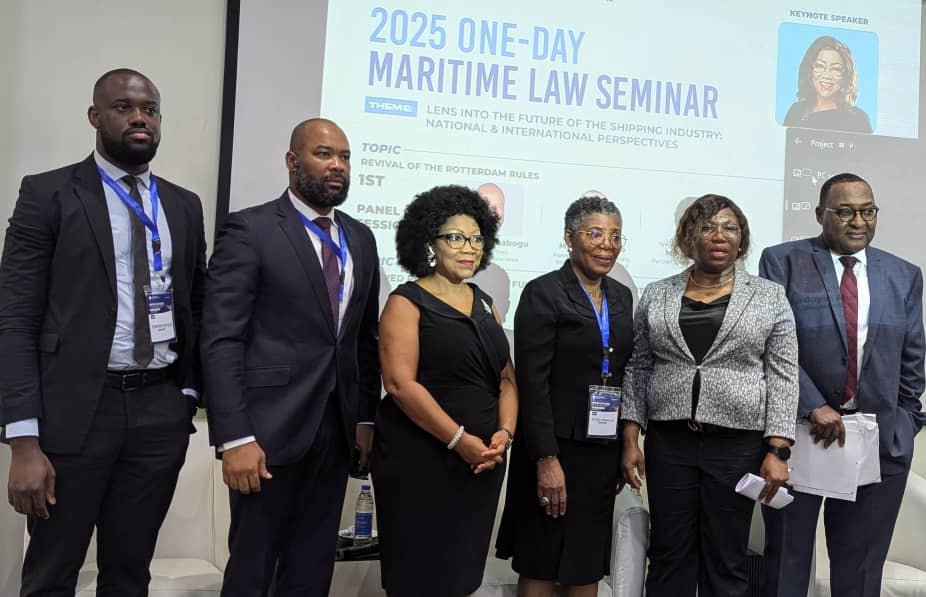
Lagos: Maritime lawyers have called on the Federal Government to domesticate the Rotterdam Rules to enhance the competitiveness of Nigerian importers in global trade.
They made the appeal on Thursday during the 2025 One-Day Maritime Law Seminar, organised by the Nigeria Maritime Law Association (NMLA) in Lagos.

(Caption: Maritime Lawyers, Dr Emeka Akabogu, Ms Chisa Uba, Mr Hassan Bello , former Executive Secretary, Nigerian Shippers’ Council NSC and Mr Temitope Oyeyemi, the monitor during the panel discussion on 2025 a day seminar of the Nigeria Maritime Law Association held in Lagos on Thursday.)
The theme of the seminar is, “Lens into the Future of the Shipping Industry: National and International Perspectives”.
Mrs Mfon Usoro, President of the Chartered Institute of Logistics and Transport (CILT), said that Nigeria need to adopt the Rotterdam Rules in its international shipping activities.
According to her, this will put Nigerian importers on a more advantageous position in international trade.

(Caption : From L-R- Maritime Lawyers, Mr Temitope Oyeyemi,Dr Emeka Akabogu Mrs Mfon Usoro, President Nigeria Maritime Law Association, Mrs Funke Agbor, , Ms Chisa Uba and Mr Hassan Bello , former Executive Secretary, Nigerian Shippers’ Council NSC and the monitor during the panel discussion on 2025 a day seminar of the Nigeria Maritime Law Association held in Lagos on Thursday.)
“The Rotterdam Rules is an international treaty that aims to overhaul the legal framework governing maritime transport and the carriage of goods by sea.
“It addresses the legal relationship between carriers and cargo owners, offering a modernised approach to shipping practices.
“Several countries, including Spain, Sweden, Switzerland, and Togo, have already ratified the Rotterdam Rules. However, Nigeria has yet to do so, with some nations hesitating to ratify the convention due to concerns that the rules may favor carriers over cargo owners,”Usoro said.
Usoro, a maritime lawyer, acknowledged that while ratifying the Rotterdam Rules, it would provide significant benefits, saying, “it is important positioning for Nigeria to adopt a “wait-and-see” approach.
The former Director-General of the Nigerian Maritime Administration and Safety Agency (NIMASA), said that this was due to the country’s current shipping infrastructure and investment climate. which he noted had not been encouraging.

She said: “A careful evaluation is crucial to determine whether ratification would serve Nigeria’s interests.
“The Comité Maritime International (CMI) recognises that political and strategic national interests must be considered when deciding whether to ratify international conventions on the carriage of goods.”
“We must ensure not only the political will but also the resources needed to follow through with the Rotterdam Rules, and wait for the majority of large shipping nations to ratify before taking the final step.” Usoro said.
She further suggested that, in the interim, Nigeria could selectively adopt certain provisions from the Rotterdam Rules to update its Carriage of Goods by Sea Act.
Usoro explained that this could be done alongside efforts to rectify the current conflict of having two existing laws on the carriage of goods.
Interacting with CMI’s Standing Committee,The CMI, which has set up a standing committee to advocate for the ratification of the Rotterdam Rules, could be an essential ally in promoting Nigeria’s interests,
She urged the NMLA to engage with this committee and negotiate provisions that might not align with Nigeria’s maritime goals.
Usoro also stressed the importance of the Cabotage Act, which was designed to promote domestic shipping capacity and workforce development, adding that the Act could serve as a crucial stepping stone for Nigerian-owned shipping companies aiming to expand into international trade.
“If the regulatory and operational aspects of cabotage are properly enforced, Nigeria can build a robust maritime industry and eventually become a key player in global sea-borne trade,” she said.
Mr Hassan Bello, also maritime lawyer, who spoke on he topic : “Revival of the Rotterdam Rules”, during the panel discussion called for careful consideration in adopting the Rotterdam Rules.
Bello, former, Executive Secretary of the Nigerian Shippers’ Council (NSC), advocated the need for Africans to come together to establish a unified law which would enable African countries trade within themselves.
He said that if Africa countries collaborate to establish a unified law that it would also attract lots of investment because there would be uniformity in their operations.
“Europeans are very integrated and their laws are harmonise why African are still in disparative difference which work against our interest and investment.
“If African should come together and unified their business laws then there will be influx of investment.” he said
Dr Emeka Akabogu, another maritime lawyer, explained that Nigeria’s Carriage of Goods by Sea Act primarily addresses shipping transactions involving cargo movement from one country to another, a process where incidents might occur along the route.
He noted that when such incidents arise, questions about liability and compensation often follow.
“If cargo is being transported from China to Nigeria, passing through multiple jurisdictions, where exactly should the liability be determined?” Akabogu asked.
He explained that, for many years, carriers and ship-owning interests had conveniently structured contracts to limit their liability, often to the disadvantage of cargo owners.
Akabogu said this was why the Hague-Visby Rules, signed into law in 2024, sought to establish uniform standards for determining liability and to provide a level of predictability in international trade.
Another maritime lawyer, Ms Chisa Uba, noted that the Nigerian government had previously hesitated to ratify the Rotterdam Rules due to infrastructure challenges and concerns about the country’s readiness to implement the provisions effectively.
She also pointed out that several major shipping nations were themselves reluctant to ratify the treaty.
“Many developed countries, including the United States, were not comfortable with the new liability frameworks introduced in the Rotterdam Rules.
“These provisions shifted more responsibility to developed shipping nations, which made them hesitant to adopt the convention,”Uba said.
Earlier, in her welcome address, President of the Nigerian Maritime Law Association (NMLA), Mrs Funke Agbor, highlighted that NMLA is the Nigerian branch of the Comité Maritime International (CMI).
The lawyer said that the seminar was organised as part of the association’s ongoing commitment to bring important maritime legal issues to the attention of the industry.
“One of the goals of CMI is to promote the ratification and implementation of the Rotterdam Rules.
“We felt it was necessary to bring these discussions to the maritime community for broader engagement,”Agbor said.
She commended the dedication of NMLA members for their continued efforts to teach, learn, and engage with evolving issues in maritime law and operations.
Agbor also emphasised the growing recognition of Nigeria’s maritime sector at the federal level, as demonstrated by the creation of the Ministry of Marine and Blue Economy.










